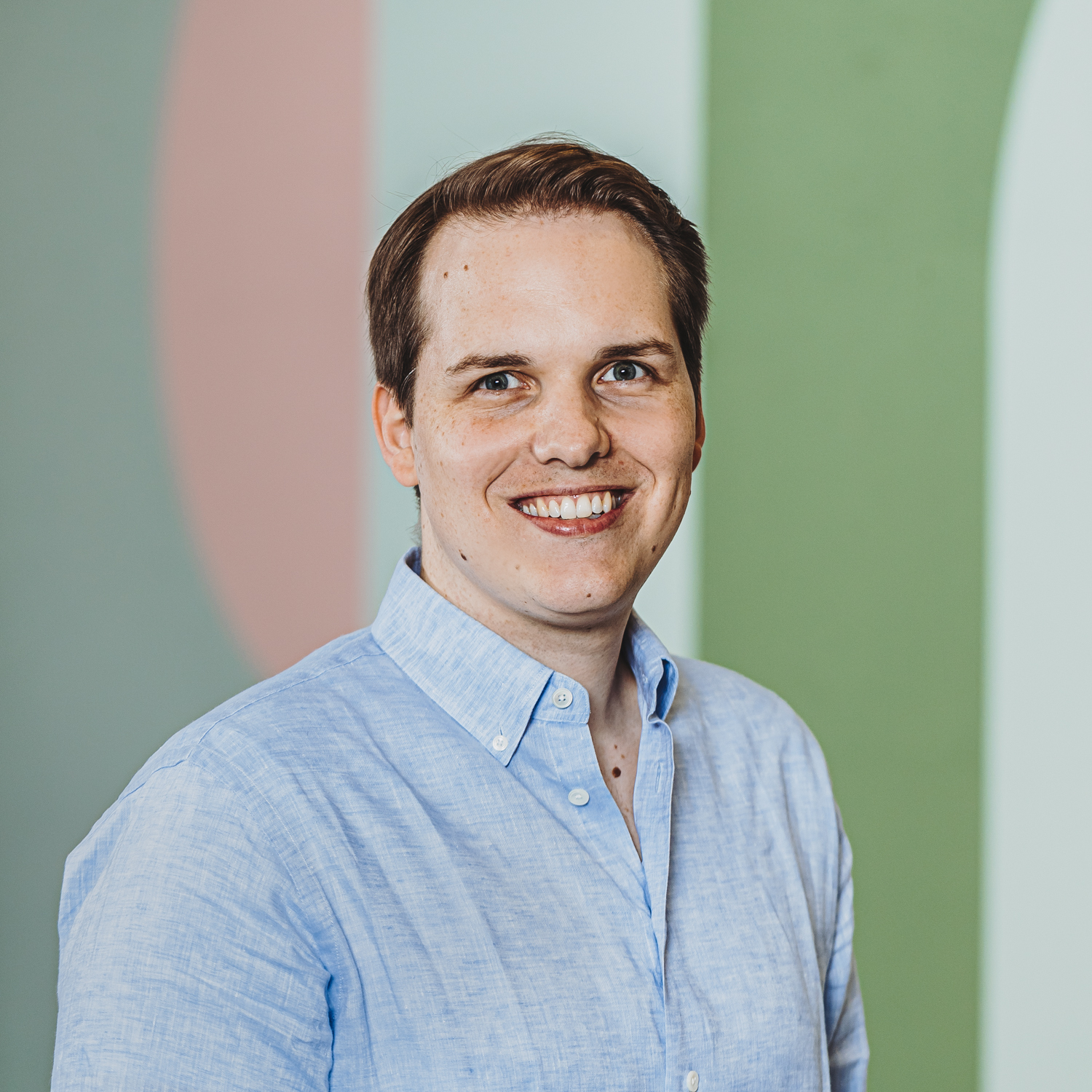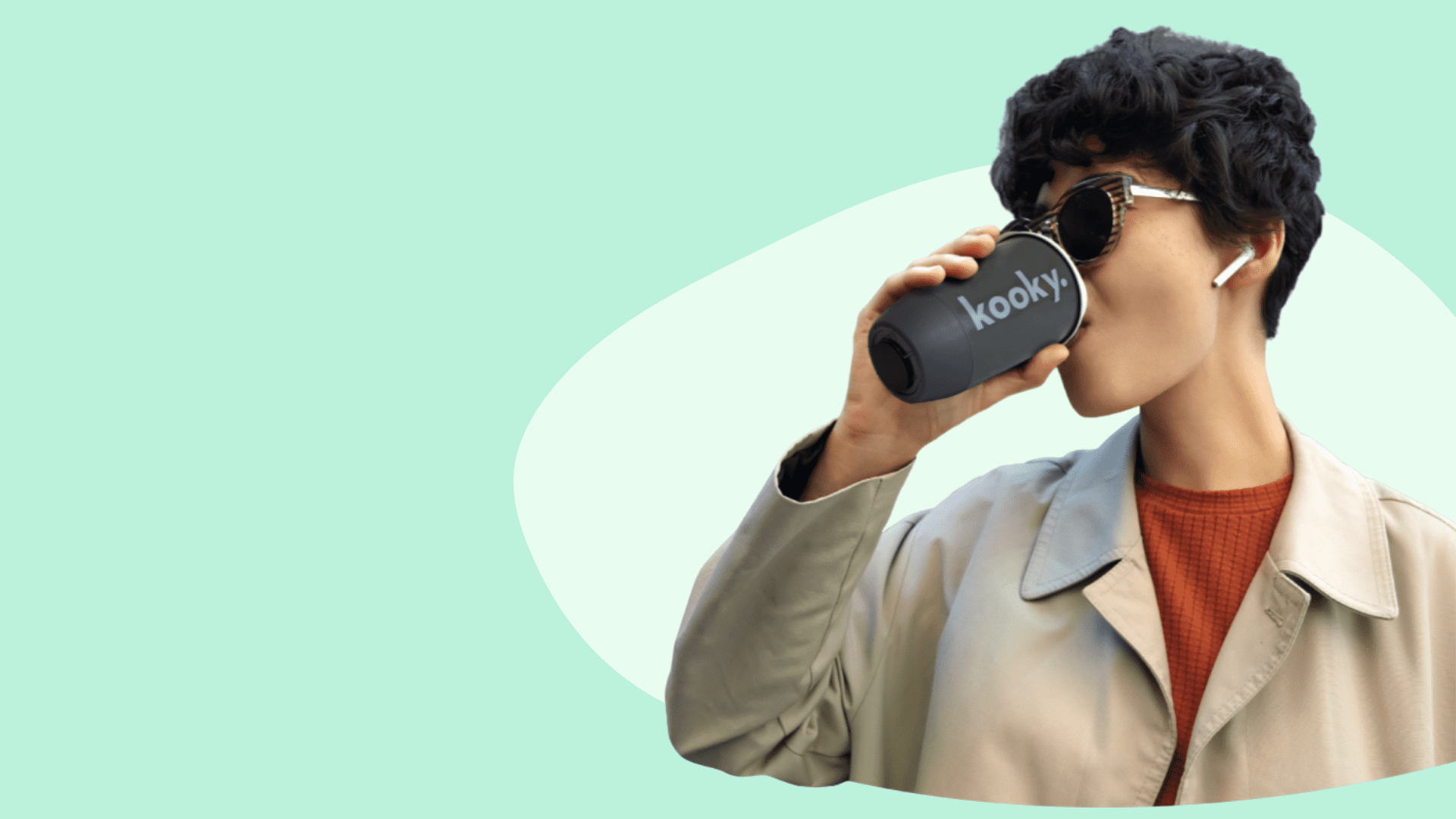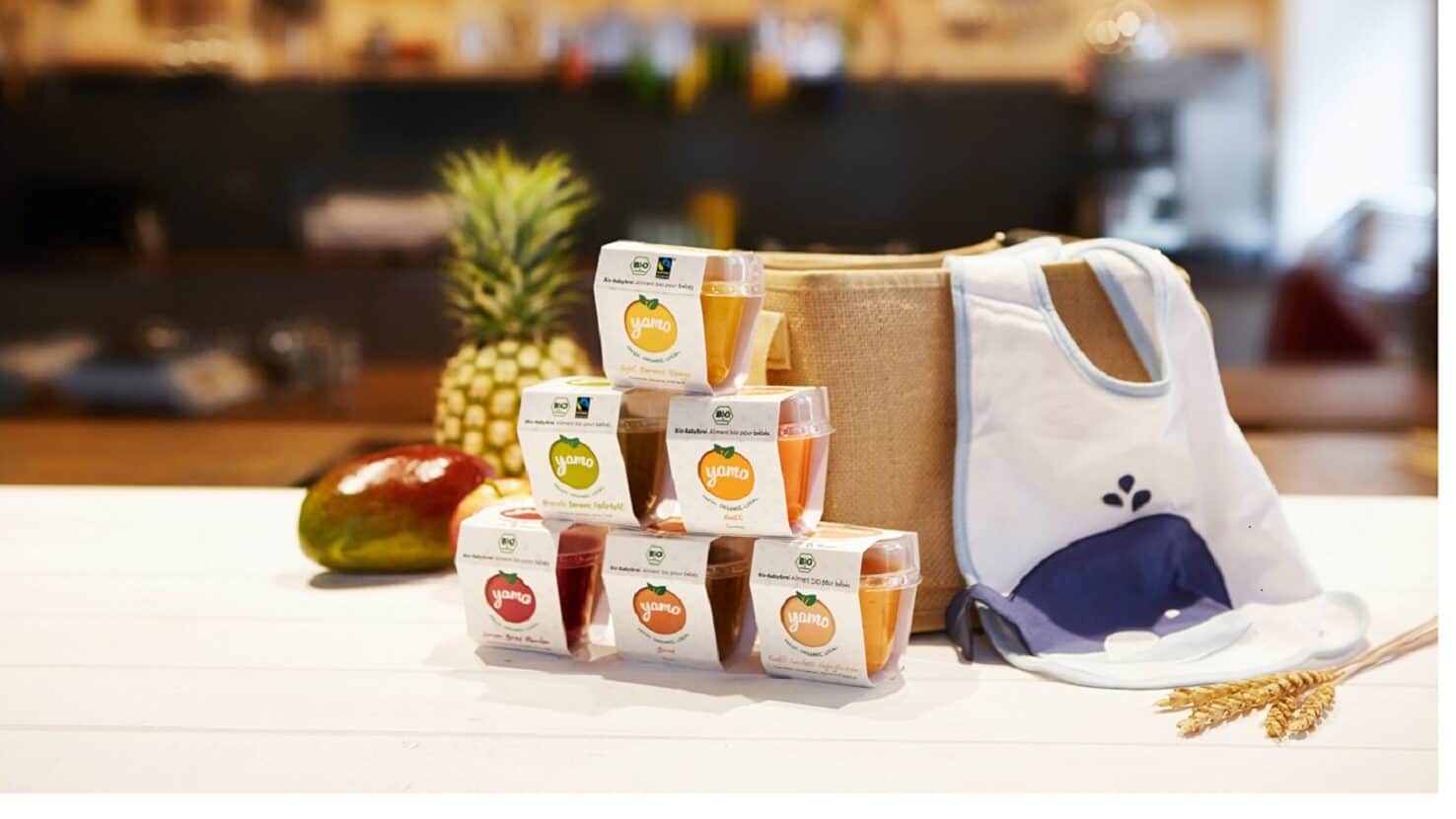In one year, the number of stores stocking yamo’s baby and child food products went up from 100 to 3200. In addition to Coop in Switzerland or dm in Germany, they are now available at big retailers like Carrefour Spain and Continente Portugal. Co-Founder and CEO Tobias Gunzenhauser talks about his ambitions of making yamo the leading children’s food brand in Europe and the importance of fostering a community of like-minded people around it.

Co-Founder and CEO, yamo
Tobias Gunzenhauser launched yamo in 2018 with Luca Michas and José Amado-Blanco. yamo produces healthy and fresh plant-based food and snacks for babies and children and employs around 40 people. Verve Ventures invested in yamo in 2020 in its Series A.
When yamo started in 2018, it launched a novel baby food based on HPP processing technology that preserves vitamins. Now, yamo also offers snack bars, plant-based yogurts, and oat drinks for children. What have you learned from launching new products and expanding into new categories?
Launching a new product is a complex process that takes time. We work with co-manufacturers and we had to evaluate new partners and convince them to work with us. It helped that yamo was already established as a brand. The retail chains that stock our products are hungry for innovation, they want consumers to get excited about new products. With 12 new products in 3 categories, we showed them a faster pace of innovation than they’re used to. But the most central point for yamo is that our consumers are not our clients – parents buy our products for their babies and children. From the beginning, we needed to establish trust with parents. Our hypothesis was that this relationship can be prolonged as their children grow up. It proved to be right.
So yamo expanded in terms of age category. What about the geographical expansion? How difficult is it to win clients in new countries?
It takes a lot of patience. Retailers want new products, but they also don’t want to take the risk of taking on products that flop on their shelves. If you think about it, it is obvious why there are only a handful of really large food companies in the world. The barriers to entry are high, and there is a lot of groundwork to be done to ensure consistent quality at scale. But the adage that you only need to convince one big client and then the others will follow proved true. Carrefour in Spain started stocking our products for children. They said they were looking for a plant-based yogurt for children and we were the only company that could offer it. Soon afterward Carrefour Belgium followed, and now Continente, the biggest retailer in Portugal. The number of stores stocking yamo products went up by a factor of 32 in one year, from 100 in Q1 2021 to 3200 now.
That growth rate will be difficult to keep up with.
Indeed. Our goal is to double the number of stores this year.
Will you double the headcount as well?
No, fortunately, our business model scales well. But we are hiring for many different roles at the moment. And for some positions, it’s tough. We have to find people that are enthusiastic about our mission and impact, and who cherish working in a company where everyone still counts. I’d even say that the requirements of working for a startup are a lot higher than in a corporation. It’s not just a 9 to 5 job, and you need to be able to set your own goals. We lead with objectives and key results (OKRs). This means that our employees need to be able to define their own goals according to our company goals. Some candidates, even with brilliant CVs, seem to be overburdened by that. Looking back, we should have hired an HR Manager earlier. These hires can organize processes and manage recruiting in a way that takes an enormous burden away from the rest of the company.
How has the pandemic affected yamo?
It has cost us a lot in terms of the speed of our expansion. When the pandemic started, retailers put all new projects on hold. There was also a marked effect on supply chains last year. The prices of packing material spiked in the second quarter but started to normalize towards the end of the year. Today, you have to order materials longer in advance, say, 16 weeks instead of 8. We will see how rising energy prices will affect our production costs. Interestingly enough, some suppliers wanted to increase their prices and when we asked them for a reason, they could not provide a valid one. It seems like some companies just want to profit from these circumstances, and you need to push back against such behavior.
Yamo pursues an omnichannel strategy. You sell products via retailers but also directly to the consumer via your website. Has the digital channel lost its importance for you because of the rapid roll-out in stores?
Not at all, it is still a central channel that contributes more than half of our sales. We’ve experienced a strong increase in demand on the direct-to-consumer channel during the pandemic because people stayed at home and became more used to buying things online.
We’re investing in hiring new people with digital expertise to make the shopping experience even better, and not just transactional but nurture the relationship with parents. At the moment we only sell online to Germany, Switzerland, and Austria but we’ll expand to new countries where our products are already present and people are starting to get to know us.
Community building is at the center of our marketing strategy. That sounds banal but it is a lot of hard work. yamo has the aspiration to reply to every single person that leaves a comment, no matter the platform.
What is your marketing strategy?
The big brands of the past used to shout at the customer. They did billboard advertising and TV ads and expected people to buy, buy, buy. That no longer works. Young parents resent the distance between themselves and the big brands, and they do not feel understood by them. We want to be different, and approachable. Community building is at the center of our marketing strategy. That sounds banal but it is a lot of hard work. yamo has the aspiration to reply to every single person that leaves a comment, no matter the platform. We have a conversation with parents, not just about healthy food, but a lot of different topics that are important to them. Our blog has 200’00 visits monthly. And this is just the start. We continue to invest in content. We are starting to explore influencer marketing by identifying people that share a common mission with us and we want to help them get their own message across. We think about how to translate content into video and invest a lot in building our presence on TikTok. Our target audience is starting to be active there. Instagram and Pinterest are other relevant channels, whereas Facebook has lost its importance to us.

Invest in Startups
As one of Europe’s most active venture capital investors, we grant qualified private investors access to top-tier European startups. With investments starting at EUR/CHF 10’000, you can build your own tailored portfolio over time and diversify across stages and sectors.
The German food company Hipp, a giant with more than EUR 1bn turnover, took legal action against your production method HPP, which many other companies used before, and said it was unsafe. The courts threw this lawsuit out. A lot of media coverage followed. How did you feel during that costly struggle? I mean, your company was at risk at that time.
It was quite scary: If we would have lost the lawsuit against our production method, the consequence – not being able to sell in Germany anymore – could have killed us. That wasn’t a fun time at all. It is true that there was a lot of media coverage, but I was a bit disappointed that many journalists just focused on the “David vs Goliath” story without digging deeper into the merits of the lawsuit. But one article from Handelsblatt stood out because the journalist managed to elaborate on the absurdity of the claim very well. For me, the important thing is that we managed to be left in peace now. Because since this became public in the press we haven’t heard anything from Hipp again.
You stated in an email to shareholders that you want to build yamo into the leading children’s food brand in Europe. Aren’t these very big words for a startup of your size? Annual sales of baby food alone amount to EUR 10bn per year.
Our mission is to set the standard for children’s nutrition. If there is any way to improve products that are widely consumed by making them healthier or delivering them in a different way, by using novel technology or better raw materials or packaging material, we want to be the first ones to do it. That is what I mean by “leading”. In terms of size, I agree that there is plenty of room to become a very big company as well.
But yamo also poses a challenge to retail chains. If they want to stock your baby food, they need to install refrigerators in the baby food aisle. Some might be reluctant to make such modifications and investments.
We don’t want to reinvent the retail world. But the point is that what makes our baby food fresh also creates the need for it to be refrigerated. However, our kids’ products don’t need such infrastructure, for example, the yogurts are stocked with other yogurts, of course. What we need is buy-in from the very few people that decide on what consumers will see in a store. And honestly, it’s a no-brainer when you look at the figures. Oat milk is one of the fastest-growing food categories in the world.
Speaking of the world: would you rather continue to grow in Europe or could you imagine taking a big leap to other very large markets? And do you think you could convince investors to finance such aggressive growth?
We want to build a strong European footprint first. But we do get a lot of messages from distributors in all kinds of countries, for example, Singapore, Taiwan, or the United Arab Emirates, that are interested in our product line. For the time being, we don’t have the resources or know-how necessary for it. But why not make a bold move at one point? Our value proposition is very solid, and with the right partners and the help of local investors, such an expansion could be undertaken. If you look at the global success Oatly has become, many people don’t know that one of its biggest investors is from China. Howard Schultz, the founder and CEO of Starbucks, invested in Oatly as well, which is the reason why you’ll find Oatly in all Starbucks cafés worldwide.
Written by
WITH US, YOU CANCO-INVEST IN DEEP TECH STARTUPS

Verve's investor network
With annual investments of EUR 60-70 mio, we belong to the top 10% most active startup investors in Europe. We therefore get you into competitive financing rounds alongside other world-class venture capital funds.
We empower you to build your individual portfolio.
More News
30.03.2022
Coffee-to-go without mountains of waste
kooky has developed a system of reusable cups combined with IoT technology. But the key to replacing disposable cups is a system that balances the interests of all stakeholders, explain co-founders Torge Barkholtz and Maximilian Zott.
09.07.2020
How food startup yamo found
the right formula
Having a yummy product is always a good starting point. And if it fits well with the megatrend of healthy living, that’s even better. But a key element to the success of a brand is distribution. The story of food startup yamo, which just raised EUR 10.1 million, offers some valuable lessons.
19.08.2019
Why companies and families need a mission
Gabriel Baldinucci is a successful entrepreneur and was Vice President on the New Ventures team at Richard Branson’s Virgin Group. He’s now developing new projects for Singularity University in Santa Clara, California. In this interview, Gabriel talks about the importance of innovation for corporations and wealthy families.
Startups,Innovation andVenture Capital
Sign up to receive our weekly newsletter and learn about investing in technologies that are changing the world.




